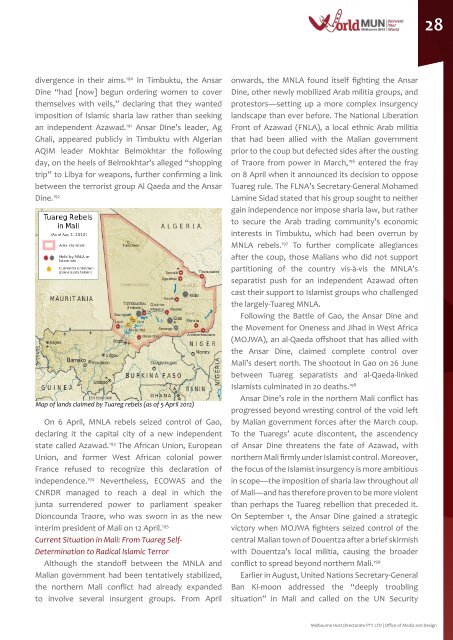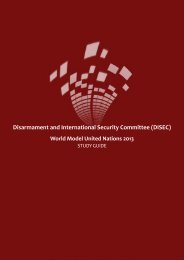Security Council - World Model United Nations
Security Council - World Model United Nations
Security Council - World Model United Nations
Create successful ePaper yourself
Turn your PDF publications into a flip-book with our unique Google optimized e-Paper software.
divergence in their aims. 190 In Timbuktu, the Ansar<br />
Dine “had [now] begun ordering women to cover<br />
themselves with veils,” declaring that they wanted<br />
imposition of Islamic sharia law rather than seeking<br />
an independent Azawad. 191 Ansar Dine’s leader, Ag<br />
Ghali, appeared publicly in Timbuktu with Algerian<br />
AQIM leader Mokhtar Belmokhtar the following<br />
day, on the heels of Belmokhtar’s alleged “shopping<br />
trip” to Libya for weapons, further confirming a link<br />
between the terrorist group Al Qaeda and the Ansar<br />
dine. 192<br />
Map of lands claimed by Tuareg rebels (as of 5 April 2012)<br />
On 6 April, MNLA rebels seized control of Gao,<br />
declaring it the capital city of a new independent<br />
state called Azawad. 193 the African union, european<br />
union, and former West African colonial power<br />
France refused to recognize this declaration of<br />
independence. 194 Nevertheless, ECOWAS and the<br />
CNRdR managed to reach a deal in which the<br />
junta surrendered power to parliament speaker<br />
dioncounda traore, who was sworn in as the new<br />
interim president of Mali on 12 April. 195<br />
Current Situation in Mali: From Tuareg Self-<br />
Determination to Radical Islamic Terror<br />
Although the standoff between the MNLA and<br />
Malian government had been tentatively stabilized,<br />
the northern Mali conflict had already expanded<br />
to involve several insurgent groups. From April<br />
onwards, the MNLA found itself fighting the Ansar<br />
Dine, other newly mobilized Arab militia groups, and<br />
protestors—setting up a more complex insurgency<br />
landscape than ever before. The National Liberation<br />
Front of Azawad (FNLA), a local ethnic Arab militia<br />
that had been allied with the Malian government<br />
prior to the coup but defected sides after the ousting<br />
of traore from power in March, 196 entered the fray<br />
on 8 April when it announced its decision to oppose<br />
Tuareg rule. The FLNA’s Secretary-General Mohamed<br />
Lamine Sidad stated that his group sought to neither<br />
gain independence nor impose sharia law, but rather<br />
to secure the Arab trading community’s economic<br />
interests in Timbuktu, which had been overrun by<br />
MNLA rebels. 197 to further complicate allegiances<br />
after the coup, those Malians who did not support<br />
partitioning of the country vis-à-vis the MNLA’s<br />
separatist push for an independent Azawad often<br />
cast their support to islamist groups who challenged<br />
the largely-Tuareg MNLA.<br />
Following the Battle of Gao, the Ansar dine and<br />
the Movement for Oneness and Jihad in West Africa<br />
(MOJWA), an al-Qaeda offshoot that has allied with<br />
the Ansar Dine, claimed complete control over<br />
Mali’s desert north. The shootout in Gao on 26 June<br />
between Tuareg separatists and al-Qaeda-linked<br />
islamists culminated in 20 deaths. 198<br />
Ansar Dine’s role in the northern Mali conflict has<br />
progressed beyond wresting control of the void left<br />
by Malian government forces after the March coup.<br />
To the Tuaregs’ acute discontent, the ascendency<br />
of Ansar dine threatens the fate of Azawad, with<br />
northern Mali firmly under Islamist control. Moreover,<br />
the focus of the Islamist insurgency is more ambitious<br />
in scope—the imposition of sharia law throughout all<br />
of Mali—and has therefore proven to be more violent<br />
than perhaps the Tuareg rebellion that preceded it.<br />
On September 1, the Ansar Dine gained a strategic<br />
victory when MOJWA fighters seized control of the<br />
central Malian town of Douentza after a brief skirmish<br />
with Douentza’s local militia, causing the broader<br />
conflict to spread beyond northern Mali. 199<br />
earlier in August, united <strong>Nations</strong> Secretary-General<br />
Ban Ki-moon addressed the “deeply troubling<br />
situation” in Mali and called on the UN <strong>Security</strong><br />
28<br />
Melbourne Host Directorate PTY LTD | Office of Media and Design
















